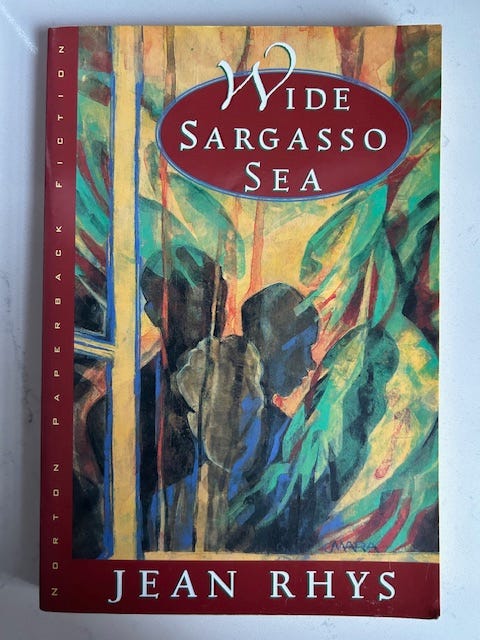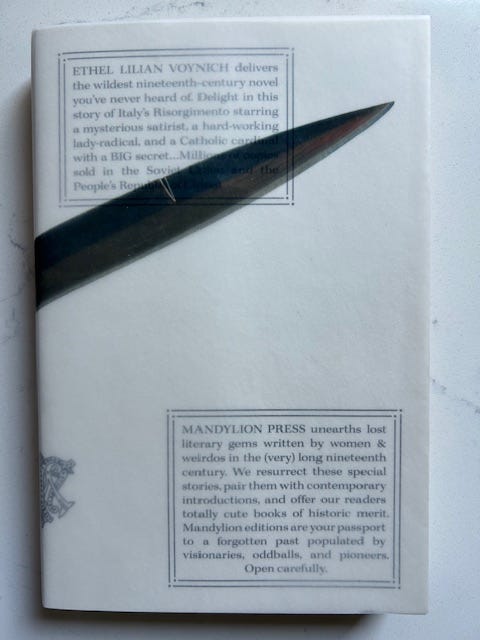'Wide Sargasso Sea' by Jean Rhys
'We stared at each other, blood on my face, tears on hers. It was as if I saw myself.'—Review #244

I didn’t know much about ‘Wide Sargasso Sea’ or Jean Rhys when I bought this novel at a second-hand bookstore in Washington, D.C. I dimly remembered there was an NC-17 film adaptation in the 1990s and that it was somehow connected to ‘Jane Eyre’ by Charlotte Brontë. I figured it would be a romantic period drama when Books on GIF subscribers picked it for me to review, but, as you’ll see:
Here’s the book’s cover:

The novel is divided into three parts. The first opens in Jamaica in the mid-1800s, shortly after England abolishes slavery there. We follow Antoinette Cosway, a young girl whose father, now deceased, owned a former slave-holding estate where Antoinette, her disabled younger brother, Pierre, and their mother still live, along with servants and a nursemaid named Christophine. Antoinette is a withdrawn child, shunned by her cold and increasingly desperate mother, and bullied by other children. The family also is ostracized by other whites in the colony because, among other reasons, the Cosways are viewed as lower-class since they were born in the Caribbean and not in England. Eventually, as her loneliness and isolation become untenable, Antoinette’s mother marries a Mr. Mason, but disaster ensues. When the estate was occupied only by a widow and her children, the freed slaves living nearby mostly ignored them. Mason’s arrival sparks anger that leads to:

The second part of the novel jumps ahead several years and is told from the perspective of Antoinette’s husband, Rochester. The marriage had been brokered by Mason, and Antoinette was fearful and upset at entering a union with a stranger. She wants more than anything to be loved, but Rochester does not love her as much as he does his control over her inheritance. Things turn bad quickly. Rochester, originally from England, feels out of place in Jamaica. The weather is too hot, the environment too foreign, and the servants give him constant side-eye. He also resents Antoinette’s connection to the land and its people, as it shows she has knowledge and relationships he cannot possess or control. He turns cold, violent and cruel in ways I won’t spoil here. But the consequences of his actions are seen in the novel’s third part, which occurs across the actual Sargasso Sea—a region of the Atlantic bordered by a gyre of ocean currents. (I’ve been thinking a lot about how an endlessly spinning sea is a powerful metaphor for the constant churn of history, and the relentless forces that can divide people.) This section of the book returns to Antoinette’s perspective, and it connects to what I understand are events in ‘Jane Eyre,’ similarly to how the end of ‘Rogue One: A Star Wars Story’ segues straight into:

A ‘Star Wars’ fan might call ‘Wide Sargasso Sea’ a non-canon prequel to ‘Jane Eyre,’ or even fan fiction, but you don’t need to have read the latter to appreciate and understand the former. I haven’t read Charlotte Brontë’s book, but I was riveted to Jean Rhys’s novel. Now I definitely want to read ‘Jane Eyre’ to get the rest of the story, and when I saw a copy pop up on Womb House Books Friday night while writing this newsletter, I was like:
‘Wide Sargasso Sea’ is a brilliant and chilling work that shows a society split by hate and mistrust where a young woman is trapped by circumstances she is powerless to change and by a man who is selfish, greedy and bereft of empathy. Although, it’s set in the past, many of its themes about race, gender and class divisions, as well as the unresolved legacies of slavery and colonialism, resonate today. Rhys writes efficiently and beautifully. The story moves quickly, but the characters and their environments are vividly rendered. The novel also is intense, and some readers might not be up for that kind of journey right now. Even so, ‘Wide Sargasso Sea’ is definitely worth reading.
An opening excerpt:
They say when trouble comes close ranks, and so the white people did. But we were not in their ranks. The Jamaican ladies had never approved of my mother, ‘because she pretty like pretty self’ Christophine said.
She was my father’s second wife, far too young for him they thought, and, worse still, a Martinique girl. When I asked her why so few people came to see us, she told me that the road from Spanish Town to Coulibri Estate where we lived was very bad and that road repairing was now a thing of the past. (My father, visitors, horses, feeling safe in bed—all belonged to the past.)
Another day I heard her talking to Mr. Luttrell, our neighbour and her only friend. ‘Of course they have their own misfortunes. Still waiting for this compensation the English promised when the Emancipation Act was passed. Some will wait for a long time.’
How could she know that Mr. Luttrell would be the first who grew tired of waiting? One calm evening he shot his dog, swam out to sea and was gone for always. No agent came from England to look after his property—Nelson’s Rest it was called—and strangers from Spanish Town rode up to gossip and discuss the tragedy.
My rating:

‘Wide Sargasso Sea’ by Jean Rhys was originally published by André Deutsch in 1966 and by W.W. Norton in 1982. 189 pages. $13.90 at Bookshop.org.
What’s next:
Next week, we’ll have a discussion thread. The following week’s newsletter will feature the novel you voted for in last week’s poll—‘The Gadfly’ by Ethel Lilian Voynich.
Before you go:
ICYMI: Review #243
Read this: ‘The Many Confrontations of Jean Rhys’ in The New Yorker (subscription may be required) offers a glimpse into the life and career of the author. Rhys was born on the Caribbean island of Dominica, and faced exclusion and torment similar to her ‘Wide Sargasso Sea’ protagonist. She wrote a handful of novels in the 1920s and ’30s, before dropping out of the literary world. A humorous anecdote reveals how far removed she became: In 1949, an actress wanted to adapt one of Rhys’s early novels and took out a personal ad looking for information about how to reach the author. ‘Very tactless of me to be alive,’ Rhys apparently said later, according to the article. But her connection to the actress inspired Rhys to resume writing, leading to her final novel, ‘Wide Sargasso Sea.’
Read this, too: Tembe Denton-Hurst’s review of Miranda July’s recent novel ‘All Fours’ is worth your time.
If you enjoyed this review:
Thanks for reading, and thanks especially to Donna for editing this newsletter!
Until next time,

MPV










Great review! I read this a while back and loved it. I am also a Jane Eyre fan and have read it at least twice. I hope you like it as well.
Great review. This one has been on my list for so long but I don’t know if I can do it….
I love Jane Eyre so much and am 100000% a Rochester apologist. If loving him is wrong I don’t want to be right!!!!!